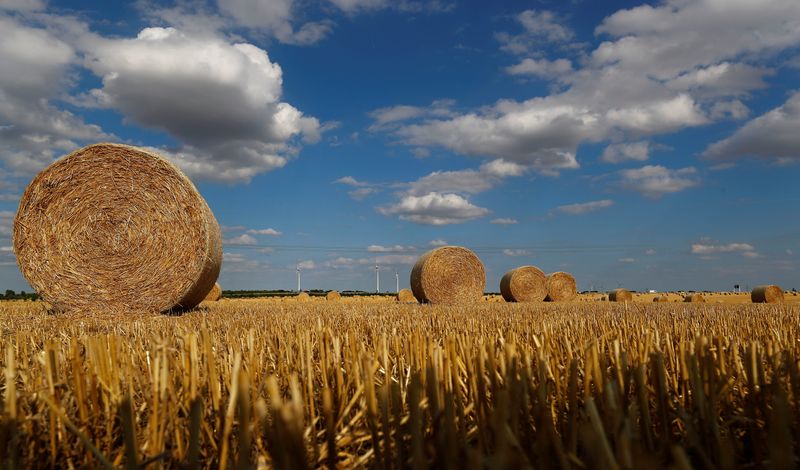By Riham Alkousaa and Lena Toepler
SPREEWALD, Germany (Reuters) - Alarmed by the prospect of global food shortages due to the conflict in Ukraine, the EU wants to get as much land in Europe as possible turned over to grains, even at the cost of biodiversity. Berlin's new greener government is pushing back.
A month into Russia's invasion of Ukraine, the European Commission decided to let farmers temporarily grow crops on land that is set aside to boost biodiversity, a step welcomed by farmers' lobbies.
Environmental groups have criticised the move, saying they feared agribusiness lobbyists could seize on the current crisis to push for the bloc to lower ecological standards coming into force in 2023 under the new Common Agricultural Policy (CAP).
Germany's Greens-led agricultural ministry decided to push back against the EU easing, allowing the land to be used only for livestock fodder, which is less detrimental to local flora and fauna as it does not require fertiliser.
"The ecological damage of opening up these areas does not outweigh the economic benefit and the harvest," Silvia Bender, the state secretary at the Greens-led agriculture ministry said.
An EU spokesperson said Germany had notified the Commission that it will not make use of the exemption granted in March for this year.
Data this week showed the EU has fallen behind on the conservation of ecosystems and biodiversity over the past five years.
Berlin's decision reflects a greater influence of the Greens party, who became part of the new, three-way coalition government last year, on Germany's agricultural policy, with a new minister calling for more organic farming and criticizing cheap meat prices, in a land known for its one-euro sausage.
Bender said the extra area that Germany could turn to crops under the new EU rules would not make an impact globally. Germany produced around 42 million tonnes of grains last year.
Using the 170,000 hectares of fallow land would have increased annual production by 600,000 tonnes, less than 1% of Ukraine's annual grain production of around 86 million tonnes.
Lucas Schwienhorst, an organic farmer in the Spreewald region just outside Berlin with 450 hectares of land, said it was land with the least soil quality that was usually left fallow anyway. Yet using fallow land for crops would significantly limit the range of species living there.
"For example, an Ortolan (bird in the bunting family) could breed well here. It always likes to have overhanging branches over its nest and that would be the case here," he said.
But not all farmers share Schwienhorst's view.
"I'm disappointed. We could have lifted this rule for a few months," said Stefan Bernickel, a 39-year-old farmer in the eastern state of Brandenburg, who looks after some 300 hectares of arable land with wheat, barley and canola.
For Bernickel, the debate about this year's crop was already too late. He is now more concerned about what regulations would be imposed for next year's harvest.
ROLLING BACK ON SUSTAINABLE FARMING?
EU agriculture commissioner Janusz Wojciechowski said he could not exclude extending the derogation of the fallow land rules to next year depending on how the situation would develop.
Germany's opposition conservatives in April sought to get ahead of the bloc, introducing a bill to parliament calling for the country to deviate from the EU target to set aside 4% of land next year. Last week, it failed to pass however.
The EU has so far stuck to its other sustainable farming plans and is set to next month propose laws to make pesticide use more sustainable and set legally binding targets to restore nature.
But critics are pushing for them to be eased too, saying they could dent grains output.
"The terrible Ukraine war with its serious consequences for global food markets was a very good opportunity for some agricultural lobbyists to take advantage of this situation," Johann Rathke, WWF agricultural policy coordinator told Reuters.
Julia Bar-Tal, a director at AbL sustainable agriculture association, said one crisis should not trump the other - that of environmental degradation and biodiversity loss.
Farmers in Germany have already expanded the area of grains sown for this year's summer harvest anyway, incentivised by rising prices, official data showed last week.
Land for spring wheat sewing is expected to increase by 73.5% while barley areas were seen rising 20.3% compared to last year as farmers shift to the more profitable crops.
